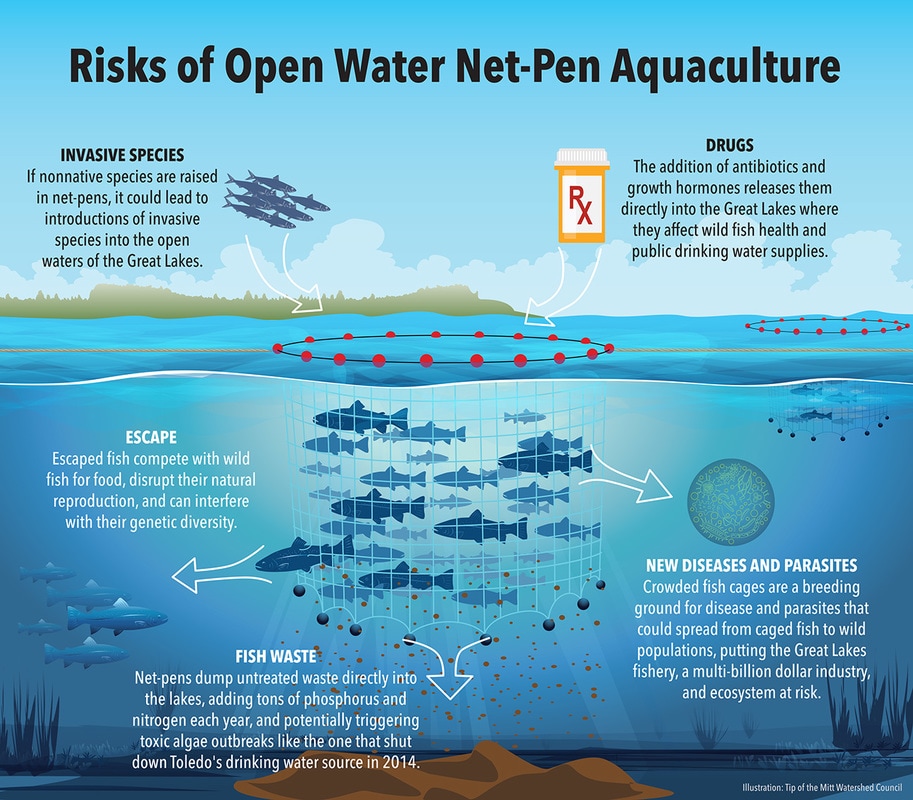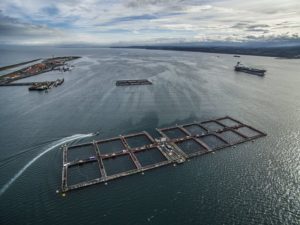Comments on Farming “Steelhead” Rainbow Trout in Salish Sea Net Pens
 PPF submitted the following comments to WDFW on Cooke Aquaculture’s proposal to raise rainbow trout in net pens in the Salish Sea—including in P.A. Harbor:
PPF submitted the following comments to WDFW on Cooke Aquaculture’s proposal to raise rainbow trout in net pens in the Salish Sea—including in P.A. Harbor:
November 7, 2019
Washington Department of Fish and Wildlife
PO Box 43200
Olympia, WA 98504-3200
RE: MDNS 19- 056: RAISING STERILE ALL-FEMALE TRIPLOID RAINBOW TROUT/STEELHEAD AT EXISTING MARINE NET PEN SITES IN PUGET SOUND
Protect Peninsula’s Future (PPF), a nonprofit public benefit corporation engaged in environmental protection and wise land use on the North Olympic Peninsula since 1973, submits the following comments regarding MDNS 19-056.
PPF opposes open water net pens and supports upland rearing of finfish—without medications and with proper waste management. Additionally we find that WDFW erred in issuing an MDNS for the projects described. In order to assure the public of marine habitat protections these projects require an up-to-date EIS for the following reasons.
1) Cooke Aquaculture has a history of unsafe management of their Washington State net pen operations including:
Hope Island and Rich Passage Facilities—A February 2018 inspection report contracted by DNR, authored by Mott MacDonald, found deficiencies at these facilities. The Report includes the following statements:
- “Inspections conducted by the Owner do not appear in accordance with manufacturer’s recommendations or industry standards.”
- “Regarding the mooring systems there is no stamped engineering documents just general information”
- “Cooke inspection records did not report a damaged anchor line.” (https://www.dnr.wa.gov/sites/default/files/publications/em_atlantic_hope_island.pdf?3otj1&ku50uq)
Cypress Island—the August 2017 catastrophic net pen collapse revealed Cooke’s neglect of their Cypress Island fish farm operation:
- “The collapse was not the result of natural causes,” said Hilary Franz, State Commissioner of Public Lands. “Cooke’s disregard caused this disaster and recklessly put our state’s aquatic ecosystem at risk.”
- “Our investigative team doggedly pursued the truth,” said Maia Bellon, director of the Washington Department of Ecology. “Cooke Aquaculture was negligent, and Cooke’s negligence led to the net-pen failure. What’s even worse was Cooke knew they had a problem and did not deal with the issue. They could have and should have prevented this.”(https://www.seattletimes.com/seattle-news/fish-farm-caused-atlantic-salmon-spill-state-says-then-tried-to-hide-how-bad-it-was/ )
Port Angeles Harbor—On December 15, 2017 the lease, set to expire in 2025, was cut short. DNR terminated the agreement after determining Cooke’s fish pens were 500 feet outside the authorized area. Cooke also had an unsafe anchoring system and was polluting the harbor with Styrofoam. (https://www.peninsuladailynews.com/news/fish-farm-to-pay-fine-imposed-by-state/)
Orchard Rocks—On October 22, 2019 a portion of a salmon pen began sinking luckily there were no salmon in the sinking portion of the pen. A small hole was identified in one bulk headed pontoon. (https://www.king5.com/article/news/local/no-salmon-released-when-cooke-acquaculture-pen-sinks/281-b4741721-30f3-402a-bd2a-017edcc87b7b)
2) Of particular concern is the MDNS “Incorporated Document”:
“Raising native-stock fish species in marine net pens is consistent with the recommendations of the Final Programmatic Environmental Impact Statement: Fish Culture in Floating Net-Pens (Washington Department of Fisheries, January 1990).” (Attachment B, pg. B-1, Par 3)
and
“Threatened and Endangered Species: 1990 Programmatic EIS Update” (Attachment B, pg.B-1, Par 3)
This is an outdated document containing outdated information. Over the past three decades, studies documented the environmental impacts of open-water net pens. So much so that HB2957 includes this passage:
HB 2957. New Section Sec. 1
But just as evidence has emerged that nonnative marine finfish aquaculture may endanger Washington’s native salmon populations, so too has evidence emerged that marine finfish aquaculture in general may pose unacceptable risks not only to Washington’s native salmon populations but also to the broader health of Washington’s marine environment.
It is vital that Washington Department of Fish and Wildlife provide protection for marine and shoreline environments.
Sincerely,
Steve Koehler, Protect the Peninsula’s Future President


